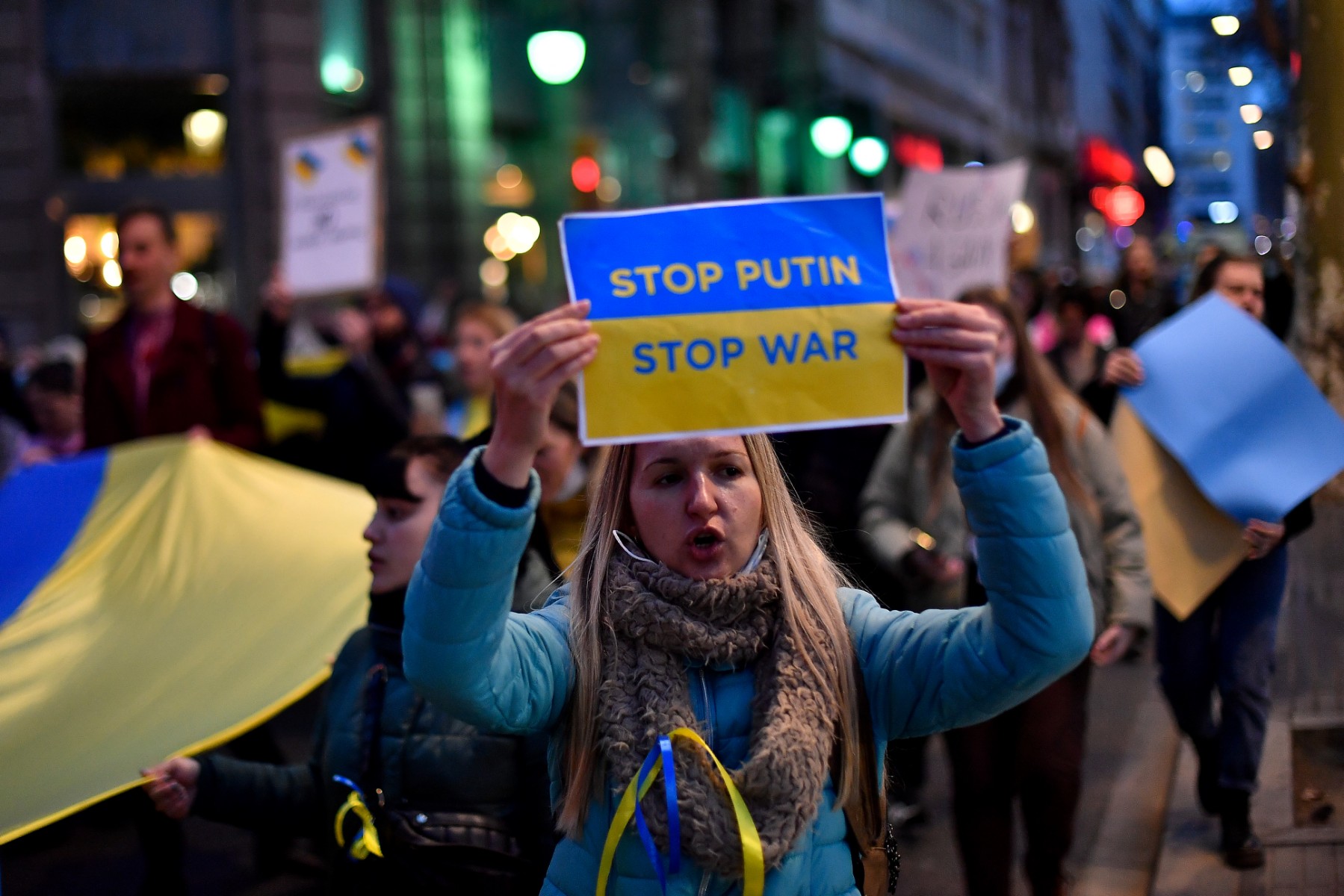Russia invades Ukraine, dozens killed

By Dave Clark, with Thibaut Marchand in Chuguiv, Ukraine
Russian President Vladimir Putin launched a full-scale invasion of Ukraine on Thursday, unleashing air strikes and sending troops deep into the country in unrest that Ukrainian authorities said left dozens dead.
The attack triggered Western warnings of unprecedented economic action against Russia as NATO and the EU condemned the invasion, while the G7 agreed on “devastating packages of sanctions”.
Weeks of intense diplomacy failed to deter Putin, who massed over 150,000 troops on Ukraine’s borders in what the West said was the biggest military build-up in Europe since World War II.
“I have decided to proceed with a special military operation,” Putin said in a televised address before dawn on Thursday.
Shortly afterwards, the first bombardments were heard in Ukraine’s capital, Kyiv, and several other cities, according to AFP correspondents.
Following a day of intense violence, the site of the Chernobyl nuclear disaster fell to Russia.
Russian airstrikes hit military installations across the country as ground forces moved in from the north, south and east, forcing many Ukrainians to flee their homes to the sounds of bombing.
The country’s defence ministry said Moscow’s forces had “successfully completed” their objectives for the day.
Olena Kurilo was among 20 wounded after a blast sent shards of glass from her windows in the eastern Ukrainian town of Chuguiv.
“Never, under any conditions will I submit to Putin. It is better to die,” the 52-year-old teacher said, her face swathed in bandages.
Ukrainian President Volodymyr Zelensky said there was now a “new iron curtain” between Russia and the rest of the world, like in the Cold War.
US President Joe Biden said that the G7 group of wealthy nations had agreed to impose “devastating” economic sanctions on Russia over the invasion.
“We agreed to move forward on devastating packages of sanctions and other economic measures to hold Russia to account. We stand with the brave people of Ukraine,” Biden tweeted.
Biden was expected to give a speech at 1830 GMT.
– Fall of Chernobyl –
Across Ukraine, at least 68 people were killed, including both soldiers and civilians, according to an AFP tally from Ukrainian official sources.
Air raid sirens sounded over Kyiv at the break of dawn after the city’s main airport was hit in the first bombing of the city since World War II.
The city declared an overnight curfew but said underground stations would remain open throughout to serve as bomb shelters.
Ukraine said that Russian forces had managed to capture an airfield near Kyiv and that Chernobyl in northern Ukraine — site of the world’s worst nuclear disaster — had fallen to Moscow’s forces.
Zelensky called the attack on Chernobyl — a vast area that has been abandoned since the disaster because of continued high levels of radioactivity — “a declaration of war on all of Europe”.
In the deadliest single strike reported by Ukrainian authorities, 18 people were killed at a military base near the Black Sea port of Odessa.
Ukraine’s emergency services also said a military plane with 14 people on board crashed south of Kyiv and that they were determining how many people died.
Ukrainian forces said they had killed “around 50 Russian occupiers” while repulsing an attack on a town on the frontline with Moscow-backed rebels, a toll that could not immediately be confirmed by AFP.
– ‘Significant economic risk’ –
In the Ukrainian village of Starognativka near the frontline where separatists have faced off against Kyiv’s forces, official Vladimir Vesyelkin said missiles had rained down since the morning and power was out.
“They are trying to wipe the village off the face of the earth,” he said.
Russia’s defence ministry said it had destroyed over 70 military targets, including 11 airfields.
Ukraine said Russian tanks and heavy armour crossed the border in several northern regions, in the east as well as from the Kremlin-annexed peninsula of Crimea in the south.
The fighting spooked global financial markets, with stocks plunging and oil prices soaring past $100.
IMF chief Kristalina Georgieva said the unrest carried “significant economic risk” for the world, but Putin insisted he did not seek to undermine the global economic system.
Enjoying this article?
Subscribe to get more stories like this delivered to your inbox.
– ‘Crime against humanity’ –
In his televised address, Putin justified the assault as a defence of the self-proclaimed Donetsk and Lugansk republics in eastern Ukraine.
The Kremlin earlier said the leaders of the two separatist territories had asked Moscow for military help against Kyiv after Putin recognised their independence on Monday.
A conflict between the separatists and government forces has dragged on since 2014, killing more than 14,000 people on both sides.
The OSCE’s acting chairman, Polish Foreign Minister Zbigniew Rau, said the invasion was a “crime against humanity”, and later the organisation said it was pulling its foreign staff from Ukraine.
NATO said it had activated “defence plans” for allied countries but alliance chief Jens Stoltenberg said there were no intentions to send NATO forces into Ukraine.
Russia has long demanded that Ukraine be forbidden from ever joining NATO and that US troops pull out from Eastern Europe.
In the Baltics, Lithuania declared a national emergency and Latvia banned three Russian TV channels that were broadcasting in the country, saying they posted a “threat to national security”.
Demonstrators took to the streets of European capitals to condemn Russia but a small anti-war protest in Moscow was quickly shut down by police and monitors said over 700 people were detained.
© Agence France-Presse
Agence France-Presse
